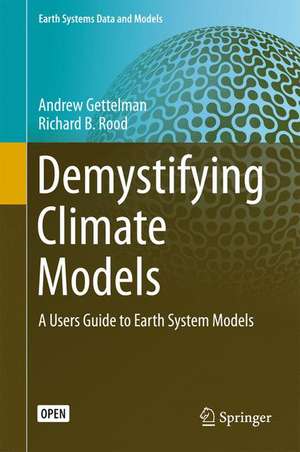Demystifying Climate Models: A Users Guide to Earth System Models: Earth Systems Data and Models, cartea 2
Autor Andrew Gettelman, Richard B. Rooden Limba Engleză Hardback – 19 apr 2016
| Toate formatele și edițiile | Preț | Express |
|---|---|---|
| Paperback (1) | 387.96 lei 6-8 săpt. | |
| Springer Berlin, Heidelberg – 22 apr 2018 | 387.96 lei 6-8 săpt. | |
| Hardback (1) | 428.68 lei 6-8 săpt. | |
| Springer Berlin, Heidelberg – 19 apr 2016 | 428.68 lei 6-8 săpt. |
Preț: 428.68 lei
Nou
Puncte Express: 643
Preț estimativ în valută:
82.03€ • 85.48$ • 67.92£
82.03€ • 85.48$ • 67.92£
Carte tipărită la comandă
Livrare economică 03-17 aprilie
Preluare comenzi: 021 569.72.76
Specificații
ISBN-13: 9783662489574
ISBN-10: 3662489570
Pagini: 200
Ilustrații: XVII, 274 p. 62 illus., 58 illus. in color.
Dimensiuni: 155 x 235 x 18 mm
Greutate: 0.59 kg
Ediția:1st ed. 2016
Editura: Springer Berlin, Heidelberg
Colecția Springer
Seria Earth Systems Data and Models
Locul publicării:Berlin, Heidelberg, Germany
ISBN-10: 3662489570
Pagini: 200
Ilustrații: XVII, 274 p. 62 illus., 58 illus. in color.
Dimensiuni: 155 x 235 x 18 mm
Greutate: 0.59 kg
Ediția:1st ed. 2016
Editura: Springer Berlin, Heidelberg
Colecția Springer
Seria Earth Systems Data and Models
Locul publicării:Berlin, Heidelberg, Germany
Public țintă
ResearchCuprins
Introduction.-Components of the Climate System.- Climate Change and Global Warming.- Essence of a Climate Model.- Simulating the Atmosphere.- Simulating the Ocean and Sea Ice.- Simulating Terrestrial Systems.- Bringing the System Together: Coupling and Complexity.- Model Evaluation.- Predictability.- Results of Current Models.- Usability of Climate Model Projections by Practitioners.- Summary and Final Thoughts.
Notă biografică
Andrew Gettelman is a Scientist in the Climate and Global Dynamics and Atmospheric Chemistry and Modeling Laboratories at the National Center for Atmospheric Research (NCAR). He is actively involved in developing atmosphere and chemistry components for global climate models at NCAR. Dr. Gettelman specializes in understanding and simulating cloud processes and their impact on climate, especially ice clouds. He has numerous publications on cloud physics representations in global models, as well as research on climate forcing and feedbacks. He has participated in several international assessments of climate models, particularly for assessing atmospheric chemistry. Gettelman holds a doctorate in Atmospheric Science from the University of Washington, Seattle. He is a recent recipient of the American Geophysical Union Ascent Award, and is a Thompson-Reuters Highly Cited Researcher.
Richard B. Rood is a Professor in the Department of Climate and Space Sciences and Engineering (CLaSP) at the University of Michigan. He is also appointed in the School of Natural Resources and Environment. Prior to joining the University of Michigan, he worked in modeling and high performance computing at the National Aeronautics and Space Administration (NASA). His recent research is focused on the usability of climate knowledge and data in management planning and practice. He has started classes in climate-change problem solving, climate change uncertainty in decision making, climate-change informatics (with Paul Edwards). In addition to publications on numerical models, his recent publications include software engineering, informatics, political science, social science, forestry and public health. Rood’s professional degree is in Meteorology from Florida State University. He recently served on the National Academy of Sciences Committee on A National Strategy for Advancing Climate Modeling. He writes expert blogs on climate change science and problem solving for the Weather Underground Richard Rood is a Fellow of American Meteorological Society and a winner of the World Meteorological Organization’s Norbert Gerbier Award.
Richard B. Rood is a Professor in the Department of Climate and Space Sciences and Engineering (CLaSP) at the University of Michigan. He is also appointed in the School of Natural Resources and Environment. Prior to joining the University of Michigan, he worked in modeling and high performance computing at the National Aeronautics and Space Administration (NASA). His recent research is focused on the usability of climate knowledge and data in management planning and practice. He has started classes in climate-change problem solving, climate change uncertainty in decision making, climate-change informatics (with Paul Edwards). In addition to publications on numerical models, his recent publications include software engineering, informatics, political science, social science, forestry and public health. Rood’s professional degree is in Meteorology from Florida State University. He recently served on the National Academy of Sciences Committee on A National Strategy for Advancing Climate Modeling. He writes expert blogs on climate change science and problem solving for the Weather Underground Richard Rood is a Fellow of American Meteorological Society and a winner of the World Meteorological Organization’s Norbert Gerbier Award.
Textul de pe ultima copertă
This book demystifies the models we use to simulate present and future climates, allowing readers to better understand how to use climate model results. In order to predict the future trajectory of the Earth’s climate, climate-system simulation models are necessary. When and how do we trust climate model predictions? The book offers a framework for answering this question. It provides readers with a basic primer on climate and climate change, and offers non-technical explanations for how climate models are constructed, why they are uncertain, and what level of confidence we should place in them. It presents current results and the key uncertainties concerning them. Uncertainty is not a weakness but understanding uncertainty is a strength and a key part of using any model, including climate models. Case studies of how climate model output has been used and how it might be used in the future are provided. The ultimate goal of this book is to promote a better understanding of the structure and uncertainties of climate models among users, including scientists, engineers and policymakers.
Caracteristici
A guide to climate simulation and prediction for the non-specialist Includes an introduction to climate science and to the essentials of the problem of predicting climate Intended as an entry point for understanding how models work and for helping judging uncertainties in their output














